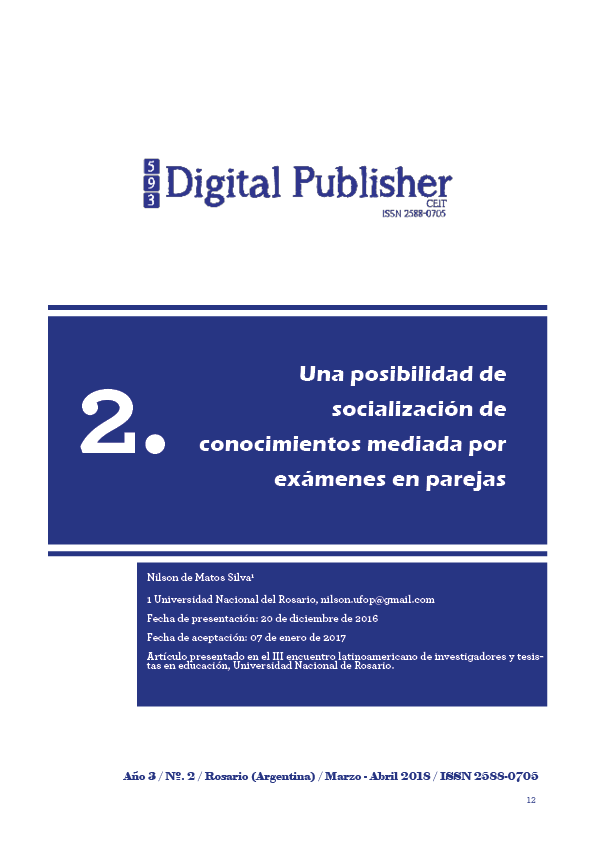A possibility of socialization of knowledge mediated by tests in pairs
Main Article Content
Abstract
The purpose of this work is to present the results of an investigation carried out by Professors of Mathematics, in a group of students of secondary education of a public school of Mines Gerais, Brazil that included methodological modifications in the evaluation of the learning by means of written tests carried out in even: their objective was to develop the evaluation like learning moment. You coincides with Moretto (2010) in that the test evaluativa should be learning moment but, like evaluation instrument, not always facilitates it. Looking for the improvement of the process, Pironel (2002) and Coelho (2008) they carried out investigations with tests in couples that, although they offered considered satisfactory results, they didn’t develop the dialogue among students, very important interaction so that it happens the learning (Viana 2002). The present investigation shows as the dialogue and, as consequence, the learning, they happen in tests carried out previously in chosen couples by the students and elaborated with different texts so the available time was insufficient to carry out them individually since its solutions demand dialogue and socialization of knowledge. It was observed that this methodology, when provoking the dialogue for the change of informations, develops the test evaluativa like learning moment.
Downloads
Article Details
1. Derechos de autor
Las obras que se publican en 593 Digital Publisher CEIT están sujetas a los siguientes términos:
1.1. 593 Digital Publisher CEIT, conserva los derechos patrimoniales (copyright) de las obras publicadas, favorece y permite la reutilización de las mismas bajo la licencia Licencia Creative Commons 4.0 de Reconocimiento-NoComercial-CompartirIgual 4.0, por lo cual se pueden copiar, usar, difundir, transmitir y exponer públicamente, siempre que:
1.1.a. Se cite la autoría y fuente original de su publicación (revista, editorial, URL).
1.1.b. No se usen para fines comerciales u onerosos.
1.1.c. Se mencione la existencia y especificaciones de esta licencia de uso.
References
Basso, A. Hein, N. (2008). Vencendo a inércia na escola. 2 ed. Pato Branco, PR: Imprepel, 92p.
Buriasco, R.(2002). Sobre avaliação em Matemática: uma reflexão. Educação em revista, Belo Horizonte, n°36, dez. p.xx-xx.
Coelho, P. C.P. (2008): Interagir – uma simples ideia – Grandes resultados: Uma proposta para avaliação de Estatística no ensino universitário. Unión – Revista Iberoamericana de Educacion Matemática, Marzo, n,13, p. 23-37.
Gipps, C.(2003). As relações avaliativas. Revista Educação e Matemática, Lisboa, n°74, set/out.
Lorenzato, S. (2006). Para aprender Matemática. Campinas, SP: Autores Associados. Luckesi, C. C. (2003). Avaliação da aprendizagem escolar. São Paulo: Cortez.
Moretto, V. (2007). Prova: Um momento privilegiado de estudo, não um acerto de contas. 2ª edição. Rio de Janeiro: Lamparina
Oliveira, M. Kohl. (2010). Vygotksy: Aprendizado e desenvolvimento: um processo sócio-histórico. São Paulo: Scipione.
Pironel, M. (2002). A avaliação integrada ao processo ensino-aprendizagem de Matemática. Dissertação de Mestrado, não publicada – UNESP, Rio Claro.
Viana, M.C.V. (2002). Perfeccionamiento del currículo para la formación de profesores de Matemática en la UFOP. (Tese de Doutorado, não publicada), Instituto Central de Ciências Pedagógicas. La Habana, Cuba.
Viana, M.C.V. (2007). A avaliação da aprendizagem na sala de aula de Matemática. In: IV Congresso Internacional De Ensino Da Matemática, 4., 2007, Canoas – RS. Anais. Canoas: Universidade Luterana Do Brasil (1 CD-ROM). Congresso da ULBRA.

